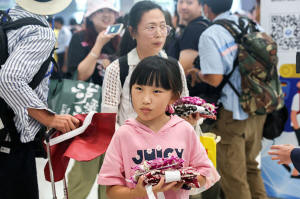Chinese tourists flock to Southeast Asia as overseas travel bounces back
 Send a link to a friend
Send a link to a friend
 [February 20, 2024] By
Sophie Yu and Anne Marie Roantree [February 20, 2024] By
Sophie Yu and Anne Marie Roantree
BEIJING/HONG KONG (Reuters) -Chinese travellers flocked to tourist
hot-spots across Asia over the Lunar New Year break, with visitor
numbers and spending in destinations including Singapore, Thailand and
Malaysia exceeding pre-COVID levels.
Visa-free access for Chinese tourists to the Southeast Asia countries
boosted traffic and signalled a robust revival in travel since Beijing
lifted strict COVID restrictions in early 2023 that had all but shut
China's borders for three years.
The increase also provides a welcome relief to countries whose tourism
industries rely on the Chinese and their spending for growth, although
the outlook for a sustained recovery in overseas travel is overshadowed
by a sluggish mainland economy and volatile financial markets that have
seen consumers tighten their belts at home.
"Despite the macroeconomic headwinds, we believe Chinese citizens are
still willing to spend on travel-related experiences ... we think
travel-related spending could continue to outpace this overall domestic
consumption," HSBC said in a research note.
Bookings to Singapore, Thailand and Malaysia combined jumped more than
30% from Feb. 10-17 compared with 2019, according to travel website
operator Trip.com, with Chinese visitors to Hong Kong, Macau, Japan and
South Korea also increasing.
The holiday in 2024 lasted for eight days, one day more than the Lunar
New year break in 2019.

Reflecting the boost from visa waivers, hotel bookings for Bangkok
tripled over the period from Feb. 10-13 year-on-year, while those for
Singapore jumped nine-fold, according to travel platform LY.com.
Spending in Singapore, Thailand and Malaysia combined on the Chinese
mobile payment platform Alipay increased 7.5% in the period from Feb.
9-12 from 2019 levels and nearly 7-fold from last year, Alipay said.
However, overall consumer spending only recovered to 82% of levels four
years ago, the company said.
MIDDLE EAST SURGE
As Chinese scour for new adventures, the Middle East proved a popular
Lunar New Year destination, with travel to Saudi Arabia up more than
nine-fold from 2019 levels and bookings to United Arab Emirates climbing
60%, Trip.com said.
The gambling hub of Macau, the only place in China where citizens can
legally gamble in casinos, recorded a surge in Chinese tourists with
more than a million visiting over the holiday and average hotel
occupancy rates reaching 95%, according to official data.
[to top of second column] |

Chinese tourists arrive during a welcome ceremony of the first batch
of Chinese tourists under a five-month visa-free entry scheme at
Bangkok's International Airport, Thailand, September 25, 2023.
REUTERS/Athit Perawongmetha/File Photo

The jump in tourists bodes well for some of the world's largest
casino operators in the former Portuguese territory, including Sands
China and Wynn Macau.
JP Morgan said in a note it expected daily gross gaming revenues for
the peak of the holiday to hit $124 million for the first time in
more than four years - higher than the $112 million generated during
the October 2023 Golden Week holiday.
Mass gaming rates were forecast to have reached 120% of pre-COVID
levels, it said, adding that it expects February gross gaming
revenues to rise by at least 80% year-on-year to $2.36 billion, the
highest in more than four years.
Across the border in Hong Kong, leader John Lee said on Tuesday more
than 1.2 million Chinese tourists visited the city over Lunar New
Year and overall hotel occupancy rates reached 90% in the first few
days. Around 1,980 group tours from mainland China visited Hong Kong
during the holiday.
South Korea's Justice Ministry said more than 114,000 Chinese
visitors entered the country during the holiday, up 4% from 2019,
while some travel agents noted tourists were increasingly opting to
travel on their own rather than in groups, which meant fewer
organised trips to mega-stores.
"With drops in the number of group tourists, we donít get to see
Chinese tourists carrying big shopping bags anymore," an official at
a travel agency in Seoul told Reuters, requesting not to be named as
he is not authorized to speak to media.
In Japan, department store operator Isetan Mitsukoshi Holdings said
that through to Feb. 14 "duty-free sales were significantly higher
than the previous year, partly due to the Chinese New Year".
A shift in holiday tastes was reflected in some data as travellers
sought more experience-based trips, with Alipay reporting Chinese
tourists globally spent 70% more on food and beverages compared with
pre-COVID levels.
Trip.com said overseas car rentals on its platform jumped 53%
compared to 2019 and tickets for scenic experiences abroad soared
more than 130%.
(Additional reporting by Brenda Goh in Shanghai, Heekyong Yang in
Seoul, Rocky Swift in Tokyo and Jessie Pang in Hong Kong; Writing by
Anne Marie Roantree; Editing by Miral Fahmy)
[© 2024 Thomson Reuters. All rights
reserved.]
This material may not be published,
broadcast, rewritten or redistributed.
Thompson Reuters is solely responsible for this content.
 |